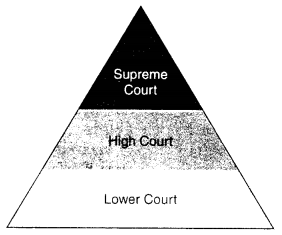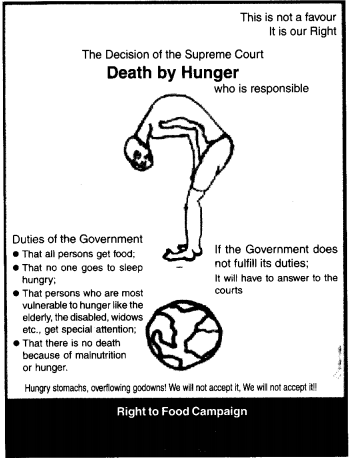NCERT Solutions for Class 8 Social Science Civics Chapter 5 Judiciary
These Solutions are part of NCERT Solutions for Class 8 Social Science. Here we have given. NCERT Solutions for Class 8 Social Science Civics Chapter 5 Judiciary
Question 1.
You read that one of the main functions of the judiciary is ‘upholding the law and Enforcing Fundamental Rights’. Why do you think an independent judiciary is necessary to carry out this important function?
Answer:
An independent judiciary is necessary to carry the function of upholding the law and Enforcing Fundamental Rights’ so that every citizen of India can approach the Supreme court if they believe that their Fundamental Rights have been violated.
Question 2.
Re-read the list of Fundamental Rights provided in Chapter 1. How do you think the Right to Constitutional Remedies connects to the idea of judicial review?
Answer:
Right to Constitutional Remedies declares that citizens can go to court for justice if they believe that any of their Fundamental Rights have been violated by the State. Hence the independence of the judiciary is necessary to uphold the rights of the citizens.
Question 3.
In the following illustration, fill in each tier with the judgments given by the various courts in the Sudha Goel case. Check responses with others in the class.
Answer:

- Lower Court: Laxman Kumar, Shakuntala, and Subhash were sentenced to death.
- High Court: All the three were acquitted.
- Supreme Court: Sentenced Laxman and Shakuntala but acquitted Subhash due to lack of evidence.
Question 4.
Keeping the Sudha Goel case in mind, tick the sentences that are true and correct the ones that are False.
(a) The accused took the case to the High Court because they were unhappy with the decision of the Trial Court.
True. They went to the Supreme Court after the High Court had given its decision.
(b) They went to the High Court after the Supreme Court had given its decision, (c) If they do not like the Supreme Court verdict, the accused can go back again to the Trial Court.
False. They can’t go to High Court after the Supreme Court’s decision as the Supreme Court is the highest level Court of the country.
(c) If they do not like the Supreme Court verdict the accused cannot go back again to the Trial Court.
False. If they do not like the Supreme Court verdict the accused cannot go back again to the Trial Court.
Question 5.
Why do you think the introduction of Public Interest Litigation (PIL) in the 1980s is a significant step in ensuring access to justice for all?
Answer:
The introduction of Public Interest Litigation in the 1980s is a significant step in ensuring access to justice for all because it allowed any individual or organization to file a PIL in the High Court or the Supreme Court on behalf of those whose rights were being violated. The legal process was greatly simplified and even a letter or telegram addressed to the Supreme Court or the High Court could be treated as a PIL.
Question 6.
Re-read excerpts from the judgment on the Olga Tellis vs Bombay Municipal Corporation case. Now write in your own words what the judges meant when they said that the Right to Livelihood was a part of the Right to Life.
Answer:
In the Olga Tellis vs Bombay Municipal Corporation case, the judges meant that the Right to Life had a wider meaning. It included the Right to Livelihood. Without means of livelihood, none can exist. By Livelihood one earns money to buy food, clothing, and shelter. Hence, none can be denied of his livelihood.
Question 7.
Write a story around the theme, ‘Justice delayed is justice denied’.
Answer:
Mr. Shankar was a government employee. After retirement, he came back to his forefather’s house. He requested the tenant to vacate the house. But the tenant did not vacate the house. Tenant challenged that if Mr. Shankar wanted to have his house vacated, he should move to court for justice. He was compelled to live in a rented house.
The owner lodged litigation against the tenant. After fighting the case for five years, the owner won the case. The decision was made in his favour by the trial court. But the tenant appealed against the lower court decision and date after date lingers on the decision and it took another ten years for justice. Mr. Shankar felt the justice unjustified as it was abnormally delayed.
Question 8.
Make sentences with each of the glossary words given?
Answer:
- Acquit: After a trial of 10 years in the Supreme Court, Mohan was acquitted of the charge of murdering his friend.
- To Appeal: I shall appeal in the higher court against the judgment of the lower court which is against me and from which I am not satisfied
- Compensation: 5 lakh was paid to Ruchi as compensation for her husband’s accidental death.
- Eviction: Eviction proceedings are pending in the court of the Rent Commissioner.
- Violation: Violation of the untouchability act is punishable under the Constitution.
Question 9.
The following is a poster made by the Right to Food campaign.
- Read this poster and list the duties of the government to uphold the Right to Food.
- How does the phrase “Hungry stomachs, overflowing godowns! We will not accept it!!” used in the poster relate to the photo essay on the Right to Food
Answer:

Duties of the Government
- That all persons get food;
- That no one goes to sleep hungry;
- That persons who are most vulnerable to hunger like the elderly, the disabled, widows, etc. get special attention;
- That there is no death because of malnutrition or hunger.
“Hungry stomachs, overflowing godowns! We will not accept it !!” do relate to the photo essay on the Right to Food on page 61 of the Textbook. We can see that due to drought in Rajasthan and Orissa, millions faced an acute shortage of food. Meanwhile, the government godowns were full of grain.
In such a situation, an organization called the People’s Union of Civil Liberties filed a PIL in the Supreme Court. It stated that the Fundamental Right to Life guaranteed in Article 21 of the Constitution includes the Right to food. The state’s excuse that they did not have adequate funds was shown to be wrong because the godowns were overflowing with grains.
The Supreme Court directed the government to provide food at cheaper prices through the government ration shops and to provide mid-day meals to children.
We hope the NCERT Solutions for Class 8 Social Science Civics Chapter 5 Judiciary, help you. If you have any query regarding NCERT Solutions for Class 8 Social Science Civics Chapter 5 Judiciary, drop a comment below and we will get back to you at the earliest.